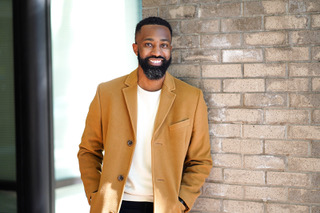Dr. Donté Flanagan, DNP, CRNA and founder of the Bigger Dreams, Better Tomorrows foundation, says his career as a nurse anesthetist was an unplanned turn that helped him find a profession he loves.
In recognition of this week’s Certified Registered Nurse Anesthetists Week (CRNA Week), Minority Nurse spoke with Flanagan about his career path and what it takes to succeed in this field.
Flanagan says his original plan included nursing school as a stepping stone to medical school. He wanted a secure career that gave him options as he moved toward that goal. But during his first year in nursing school, he heard about anesthesia as a nursing path and was intrigued. Once he saw it in action, he decided it was the choice for him.
His opportunity came unexpectedly. In Flanagan’s labor and delivery rotation, some families made it clear they didn’t want a young male nursing student attending. “I spent a lot of time at the front desk because I couldn’t see patients,” he recalls. But a CRNA noticed and one day invited him to shadow her for the day. “We did C-sections and epidurals all day,” he says. “I saw the autonomy, the interaction with patients, the assessment she did, and the camaraderie with the surgeons and other staff.”
Flanagan saw how CRNA’s are the authority on their practice in the room, so if people have questions, they look to the CRNA for validation, approval, and answers. “As a CRNA, you’re a patient advocate and you’re forced to make a decision or intervene,” he says.
Mentorship to Career
Flanagan gained a valuable mentor in that CRNA, and he continued to shadow her several times. While he was learning, he was also gaining the shadowing hours he would need to apply to his own anesthesia path. Eventually, she helped him secure a job through her own professional network. “She said, ‘You’re a young Black male with the skill set and the desire for this,’ and she saw the potential in me.” Flanagan worked as a nurse extern to obtain the required experience before graduating with his BSN from Emory University. He passed the boards and in two weeks was working in the ICU in cardiac. He went back to school for his MSN at Samford University, worked for five years, and then began his DNP degree at Columbia University with a focus on anesthesiology.
The strenuous academic requirements for becoming a CRNA are significant but critical to a CRNA practice, says Flanagan. There’s the rigorous course work and then also a regimen of clinical and procedures for the hands-on skills. “There’s strict criteria for what we need to do for procedures before we can sit for the boards,” he says, noting the need to understand the physiology and pharmacology for patients as well. “It’s an all-or-nothing career process,” he says. “You’re giving up three to four years of your life. You have to be committed to that up front.”
Prepared for the Profession
Unlike other nursing specialties, CRNAs don’t specialize in a particular patient type or condition. They have to be ready for anything from a routine surgery to significant trauma and for patients of all ages and conditions. “Hospitals have a list of what’s needed, and we fill those rooms with CRNAs.” he says.”Seventy-five percent of CRNAs don’t get to pick the surgeries they do every day.”
As the anesthesia expert, Flanagan says you’re expected to excel at what you are doing every time. “You carry that with you in everything you do,” he says. Any nurse who begins the career knows that, he says. “When you decide to go to nursing school, you are accepting ownership of the patient,” he says. “They depend on that ownership. You have to take that on when you walk into this profession.”
With the responsibility, Flanagan says the preparation and the dedication to the work become even more essential. “You do so much that you do feel comfortable and confident walking into those spaces,” he says. “That’s one of the dynamics about the role. There’s a stoicism about it. We see things that make others nervous, and we know how to resolve the issue. That makes it a lot easier to be comfortable.” The expertise becomes something CRNAs can’t switch off, he says. “Once you’re in it, it becomes part of who you are.”
As a CRNA, Flanagan is able to meet with patients and families before a procedure to get to know them and gain their trust. He explains procedure details in easy-to-understand language if they want, but respects if they’re not interested.
As with all nursing paths, nurses bring their own skills to each interaction to learn what works best for them and their patients. Flanagan’s PhD research focused on music therapy in the OR, something that remains an important part of his practice to this day. He always asks patients about the music or artists they like and would want playing in the OR. “People know that about me–there’s going to be music playing,” he says with a laugh.
Passing Along Knowledge
Thanks to that chance early connection with a CRNA who gave him an opportunity, Flanagan says the career is something he’d choose all over again. He continues to work for diversity in nursing, beginning the Bigger Dreams, Better Tomorrows foundation is a piece of that advocacy.
Flanagan recognizes the responsibility for helping the next CRNAs and showing them how the hard work pays off with everything CRNAs do with patients. “After they wake up and they thank you and tell you they appreciate that you were the one taking care of them–that never gets old.”
- Why Finding a Nursing Community Is Important - May 10, 2024
- A Camp Nurse Volunteer Shares the Joy - April 30, 2024
- Is the FNP Program Right for You? - April 24, 2024



